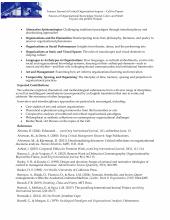The issue of workplace identity – how and why employees develop an attachment with and affinity for aspects of their work environment, and how work and non-work influences interact in the identification process, is a topic of substantial interest among both critical and ‗mainstream‘ management studies researchers (cf. Marks & Thompson, 2010). However, these streams of research have largely developed separately, with little cross-fertilization of ideas. This is also true of developments within the criticalmanagement community (e.g., between labour-process and postmodernist approaches). This paper seeks to remedy this situation by analyzing what I call ‗contextualist‘, ‗discursive‘, and mainstream approaches to the study of identity, with an eye towards synthesizing their best ideas. This may help management scholars to develop an understanding of identity that will empower lower-level employees at work.





